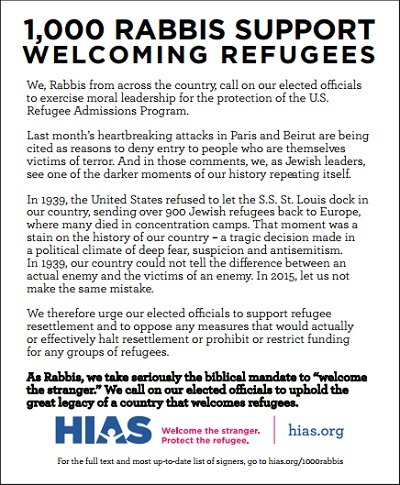
December 3, 2015; Washington Post
Even as some GOP politicians are proposing new ways to exclude Syrian refugees from resettlement in the United States, and the Senate had to vote down a crackdown measure last night, many faith communities are mobilizing to advocate for fair treatment. One of the more emotionally striking efforts is a campaign centered on a letter signed by more than 1000 Rabbis that reads, in part:
Since its founding, the United States has offered refuge and protection to the world’s most vulnerable. Time and time again, those refugees were Jews. Whether they were fleeing pogroms in Tzarist Russia, the horrors of the Holocaust or persecution in Soviet Russia or Iran, our relatives and friends found safety on these shores.
We are therefore alarmed to see so many politicians declaring their opposition to welcoming refugees.
It went on to say:
In 1939, the United States refused to let the S.S. St. Louis dock in our country, sending over 900 Jewish refugees back to Europe, where many died in concentration camps. That moment was a stain on the history of our country – a tragic decision made in a political climate of deep fear, suspicion and anti-Semitism. The Washington Post released public opinion polling from the early 1940’s, showing that the majority of U.S. citizens did not want to welcome Jewish refugees to this country in those years.
In 1939, our country could not tell the difference between an actual enemy and the victims of an enemy. In 2015, let us not make the same mistake.
Sign up for our free newsletters
Subscribe to NPQ's newsletters to have our top stories delivered directly to your inbox.
By signing up, you agree to our privacy policy and terms of use, and to receive messages from NPQ and our partners.
We therefore urge our elected officials to support refugee resettlement and to oppose any measures that would actually or effectively halt resettlement or prohibit or restrict funding for any groups of refugees.
The statement is published on the HIAS website and has been placed as a breathtaking advertisement, reminiscent of some Holocaust memorials. The Jewish community has been particularly active in making comparisons between their own refugee experiences and history and that of the newcomers. Last month, the Anti-Defamation League appealed to the governors of the states trying to block resettlements.
“This country must not give into fear or bias by turning its back on our nation’s fundamental commitment to refugee protection and human rights,” ADL chief Jonathan Greenblatt said. “Now is precisely the time to stand up for our core values, including that we are a proud nation of immigrants. To do otherwise signals to the terrorists that they are winning the battle against democracy and freedom.”
“The current refugee crisis in Europe is the worst since World War II,” he said. “The Jewish community is particularly affected by the images of men, women and children forced to flee their homes only to find they are unwanted anyplace else. Many of these refugees are fleeing the same terrorists who perpetrated the horrendous attacks on Paris.”
Many other national faith groups with a tradition of working with refugees are issuing their own statements and calls to action, including:
- Episcopal Migration Ministries
- Church World Service
- HIAS
- Lutheran Immigrant and Refugee Service
- S. Conference of Catholic Bishops
And the action on the national level is being supported by action at the local level, where groups are offering resources and advocacy on a statewide or even municipal basis. On November 15th in New Brunswick, New Jersey, religious organizations, comprising Catholic, Methodist, Reformed, Nigerian and Indonesian Christian churches, a mosque and four Muslim organizations, three synagogues, and one Buddhist organization participated in a walk to draw attention to the issue. Two days later, Governor Christie announced he was unwilling to have his state accept any more Syrian refugees despite the fact that a large community of Syrians is already settled in the area.
There are many options for involvement, in other words.—Ruth McCambridge











